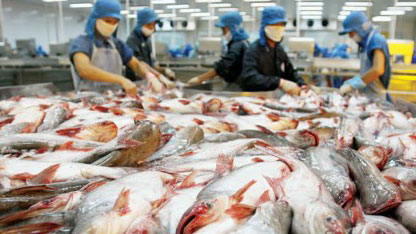Catfish exports face rigid new US import standards
 Vice President Vo Hung Dung of the Vietnam Tra Fish Association recently sat down with a VOV reporter to expound upon his views of how the the new inspection scheme will impact the tra fish industry.
Vice President Vo Hung Dung of the Vietnam Tra Fish Association recently sat down with a VOV reporter to expound upon his views of how the the new inspection scheme will impact the tra fish industry.
Following are key translated excerpts capturing the gist of the interview.
VOV: In your opinion how will the USFDA decision affect domestic tra fish production and exports? Is the March 2016 deadline too short a time period for the industry to make the necessary adjustments for compliance?
Mr Dung: The new rules constitute what are generally referred to as a non-tariff trade barriers and are intended to reduce competition for the US farm raised catfish industry with exports from other nations around the globe.
They become effective in March 2016— however there is an 18 month transition period, which provides some minimal relief for farmers to make the migration and come into full compliance with them.
Previously catfish exports to the US were regulated by USFDA guidelines. Under the new legislation that authority is transferred to the USFDA's Food Safety and Inspection Service (FSIS).
Since the new FSIS regulations have yet to be released it’s difficult to assess the full impact, but the intention to protect US fish farmers from competition by throwing up obstacles for foreign exporters such as Vietnam is crystal clear.
For obvious reasons, the new rules have raised considerable concern by farmers in the industry and the Vietnam government is taking the initiative to assist them take appropriate measures in response.
VOV: What are difficulties in enforcing the new rules?
Mr Dung: We do know the new regulations will require compliance with not only Vietgap but US standards, which will be much more stringent and introduce considerable subjectivity into the process.

This will undoubtedly result in the inspection process being more biased in favour of US farmers to the detriment of the Vietnamese catfish industry, as it targets reducing catfish imports from Vietnam by a variety of methods.
Applying Vietgap adds considerable cost to the final product and the new FSIS standards will without question be costlier. So we know that compliance with the new system will favour the US industry, be more complicated and costlier.
Each year, Vietnam companies export on average more than US$300 million worth of tra fish to the US market, accounting for a 20% market share of the catfish market. It is not a small figure.
If businesses cannot ship to the market, the tra fish industry will find themselves confronted with a very real dilemma.
VOV: If farmers comply with Vietgap will that satisfy the new FSIS standards?
Mr Dung: There is little question that compliance with Vietgap will not satisfy the new FSIS standards. The new rules will in substance be comprehensive and attempt to dictate to farmers what standards they must follow in all phases of production.
If history is any guide, in my opinion it will be quite onerous to follow the new FSIS standards and the final regulations when issued will be extremely complex and contradictory in nature.
VOV: For the so-called ‘final rules”, what issues should we bring to the forefront during upcoming negotiations with the US?
Mr Dung: Ministries and government agencies are taxed the responsibility to raise the appropriate questions. VASEP opposed the USFDA decision because it violated World Trade Organization regulations.
According to those mechanisms, Vietnam can file a lawsuit and challenge their imposition on a number of legal theories.
The new US laws are quite simply intended to be a barrier for Vietnam catfish fish to enter the US market. It should also be noted that tra fish is a species of catfish raised by farmers in the Mekong Delta.
However, in the US market tra fish cannot be sold as ‘catfish’ and the word cannot appear on the package labelling. This is another example of a non-tariff barrier that favours the US catfish industry from foreign competition.
Many US consumers by force of habit will only make a purchase if the label literally uses the word catfish, but only US farmers are allowed to use that word in the label as it tremendously benefits their sales.
VOV: Do you think domestic businesses are ready to change their production process to comply with the new requirements?
Mr Dung: Businesses and farmers will of necessity if they want to sell product in the US market have to spend considerably more money and time to change their production and processing methods to comply with the new standards.
That is, unless a lawsuit is file with the WTO challenging the new FSIS rules or through other negotiations Vietnam is accorded some relief form the harsh compliance requirements.
In short, there is no question the nation’s catfish farmers must improve the quality of their products for both domestic and foreign customers, but it doesn’t necessarily follow that the new FSIS standards are the appropriate answer.
VOV: Thank you very much.
What the stars mean:
★ Poor ★ ★ Promising ★★★ Good ★★★★ Very good ★★★★★ Exceptional
Latest News
More News
- The generics industry: unlocking new growth drivers (February 04, 2026 | 17:39)
- Vietnam ready to increase purchases of US goods (February 04, 2026 | 15:55)
- Steel industry faces challenges in 2026 (February 03, 2026 | 17:20)
- State corporations poised to drive 2026 growth (February 03, 2026 | 13:58)
- Why high-tech talent will define Vietnam’s growth (February 02, 2026 | 10:47)
- FMCG resilience amid varying storms (February 02, 2026 | 10:00)
- Customs reforms strengthen business confidence, support trade growth (February 01, 2026 | 08:20)
- Vietnam and US to launch sixth trade negotiation round (January 30, 2026 | 15:19)
- Digital publishing emerges as key growth driver in Vietnam (January 30, 2026 | 10:59)
- EVN signs key contract for Tri An hydropower expansion (January 30, 2026 | 10:57)
















 Mobile Version
Mobile Version